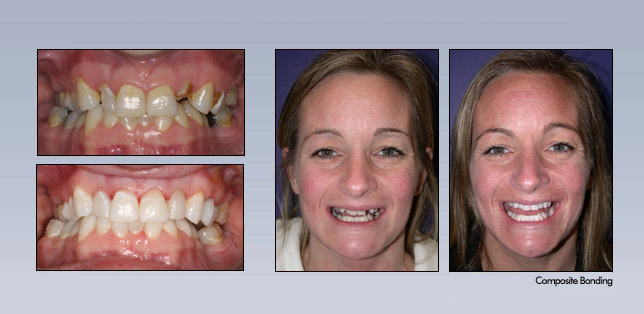Dental Bonding in Springfield & Longmeadow, MA Composite Bonding Springfield

What is Dental Bonding?
Composite bonding at Taylor Street Dental in Springfield, MA is an excellent method for correcting broken, misshapen, stained, or otherwise unsightly teeth. Dental bonding composites are materials made of acrylic resins with inorganic fillers, and containing photoinitiators. They are made to a paste-like consistency so that they can be sculpted to the proper shape. They contain various pigments which are matched to your tooth color, and they come in varying degrees of translucency, with careful attention paid to their polishability.
The dental bonding composite is applied to your tooth, sometimes in several layers, in order to duplicate the depth of color that occurs in a natural tooth. A high-intensity light is then used to harden it. With careful artistry, this dental bonding composite can be manipulated to mimic the color details and translucency of your tooth and polished to a beautiful shine.
Schedule an Appointment Today – (413) 781-7645
Who is a Good Candidate for Dental Bonding?
The dental bonding procedure is best suited for people with minor problems in the superficial part of a tooth or teeth. Bonding is usually cosmetic in nature, though it can be used for small repairs, as well. Your dentist may recommend another procedure if your concern involves more extensive decay or damage. Another trait that your dentist will insist upon is that your teeth are generally healthy. This means that, regardless of superficial damage, the tooth’s roots are healthy and the majority of the tooth’s enamel is in good condition. To ensure that the bonding procedure will achieve satisfying results that can last a long time, your dentist will perform a thorough examination of your teeth and gums to rule out any conditions that could interfere with this goal.
What Conditions Does Dental Bonding Treat?
Dental bonding can be a great treatment option for minor concerns such as small cavities, gaps, chips, cracks, or spots. The application of the tooth-colored composite can camouflage some discoloration but is not intended to be a form of teeth whitening. In some instances, bonding has been used to make teeth appear longer or to modify the shape of a tooth. Restoratively, composite resin can be used to replace old amalgam fillings or to cover tooth roots that have been uncovered by gum recession.
What Are the Benefits of Dental Bonding?
This treatment is rewarding in several ways. It is minimally invasive and may not require us to remove any tooth enamel. It is also cost-effective compared to other cosmetic treatments, like porcelain veneers. Bonding is versatile, as well, disguising a variety of imperfections using the same convenient technique. Finally, your bonding treatment can be done in a single appointment!
Do Bonded Teeth Require Special Care?
Your bonded teeth do not require much special care. You need to brush diligently twice a day and floss every day. Your bonding material can chip and it can stain, so daily care is crucial to long-lasting results. If you notice any changes to your bonded tooth, schedule a visit with your dentist.
Are there any Foods or Drinks I Should Avoid after Teeth Bonding?
The composite material that is bonded to your teeth is very durable. It can last for up to a decade with good care. However, it cannot withstand extraordinary biting and chewing force on a daily basis, so you do need to be careful about what you eat or how you eat it. For example, your dentist may advise you to avoid hard and sticky foods. It isn’t as though you can’t enjoy carrot sticks or an apple. To protect your bonding material, though, it is best to cut very crunchy and hard foods into bite-sized pieces. The same should be done with sticky foods like chewy candies. If and when you do eat sugary items, you should rinse your mouth with water. This can help you avoid tooth decay around the bonded area (as well as in other areas of your mouth). It is also a good idea to rinse with water after consuming foods or drinks that stain your teeth. If it can stain your teeth, it can stain your composite bond!
Are the Results Permanent?
Dental bonding is not permanent. It can be long-lasting, though. If you take care to brush and floss, you see your dentist regularly, and you do not bite on hard objects, your bond may last up to 10 years before requiring a touch-up.
The Teeth Bonding Process
Composite tooth bonding is usually a one-visit procedure. First, the tooth is prepared by lightly roughening the area to be repaired, which usually doesn’t require any anesthetic. Next, the surface of the tooth is etched with a gel, and a treatment of bonding primers and resins are applied to the tooth. Lastly, the bonding composite is applied.
Why Choose Taylor Street Dental?
A caution to all cosmetic dentistry patients: While any general dentist can legally announce that they are a “cosmetic dentist,” and many dentists do white fillings, we recommend that anyone who wants cosmetic composite bonding only go to a dentist with extensive post-graduate training in cosmetic dentistry. The dental bonding techniques and artistry required to do composite bonding well are not required training of general dentists. Composite bonding leaves teeth looking healthy and natural.




